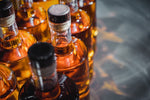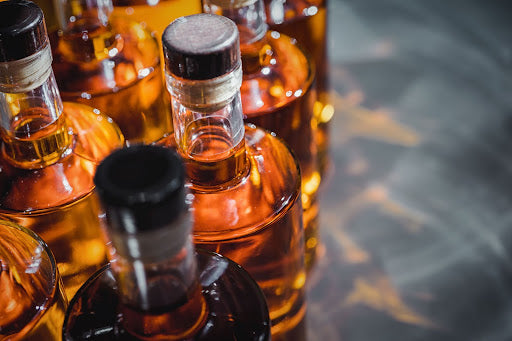
Does Whiskey Age In The Bottle?
, by Scott Connor, 5 min reading time

, by Scott Connor, 5 min reading time
You might have a bottle of whiskey that has been waiting to be opened, but does whiskey age in the bottle? Read on to learn more.

More than a thousand years ago, traveling monks brought the great gift of distillation to Scottish and Irish monasteries. But unlike their European neighbors to the south, whose rolling vineyards produced grapes worthy of the wine press, the Scots and Irish turned to grain. They soon began extracting what we know today as whiskey, or in keeping the tradition of the Scots, whisky.1
You’ve likely heard the adage of something (or someone) aging like a fine wine, but what if you were to age like a premium whiskey—would this still be a compliment? This begs the question: Does whiskey age in a bottle?
Before you pop open that 12-year Balvenie, aged an extra decade in your grandfather’s cellar, let’s take a closer look at the word aging and see what it means for whiskey.
A whiskey’s age refers to the time it spent in barrels or casks. This process takes place after distillation and before being bottled, and in many ways, it’s what defines whiskey.
Curious as to how to age whiskey? Certain whiskeys, such as bourbon or scotch, have specific timeframes they must be stored to qualify as bourbon or scotch. Each style of aged whiskey plays by its own set of rules. For example, in addition to time, bourbon must meet specific ABV levels, be made from at least 51 percent corn, and always be aged in new, charred oak barrels.2
So why the whiskey barrels? Well, it’s simple—flavor. While that may be a slight understatement, it’s true that during the maturation process, the wood makes the alcohol more palatable. As the whiskey barrels heat and cool over years of barrel aging, the sugars from the wooden barrel disperse throughout the alcohol, giving it its color and unique flavor profile.
With that said, does whiskey age in the bottle?
No, while whiskey certainly ages in wood, it does not age in the bottle. So that 12-year Balvenie, regardless of when it was bottled, is still a 12-year Balvenie—in other words, still delicious.

If wine can age in a bottle, why is it that whiskey doesn’t? To keep things simple, it’s about two things: tannins and oxidation.
Tannins and oxidation play a much more significant role in the aging of wine than whiskey. Wine, specifically red wine, has a much higher concentration of tannins. As a result, sedimentation of tannins and oxidation from the remaining air in the bottle will continue to evolve its flavor over time.4
On the other hand, whiskey gets its tannins by absorbing them from the wood it’s aged in. And while they’ll change the flavor of the whiskey as it’s barrel aging, it’s not enough to alter the taste after it has been bottled. Even with a cork, the higher alcohol content in whiskey reduces this process tremendously.
In case you’re wondering, OBE stands for Old Bottle Effect. It’s a phenomenon that has to do with the flavor of an unopened bottle of whiskey changing over time. The key word is changing as opposed to aging. We’ve already learned that a whiskey’s aging ends the moment it’s removed from the barrel, but that doesn’t mean its taste can’t change over time.
It’s a debate that remains somewhat of an enigma among aged whiskey collectors. Some believe it’s due to the prolonged oxidation process that happens with corked bottles. Others think it has to do with a change in the distillation process or a combination of the two.

While that 12-year Balvenie from your grandfather’s cellar may not qualify as a twenty-something-year-old whiskey, if it was stored properly, you may at least be able to indulge in the mystery flavor of the Old Bottle Effect. And perhaps it’s so good that you want another whiskey bottle to compare it with—that’s where we can help.
If you don’t know how to store whiskey, no worries Barbank offers a variety of spirits delivered straight to your door. Whether it's celebrity brands, rare bottles, or bundles of your favorite whiskey and tequila, Barbank has it all.
While, unlike a fine wine, whiskey will not age in the whiskey bottle. But if you're looking for a whiskey with grade and age, Barbank online liquor delivery has you covered, and it’s just one click away.
Sources: